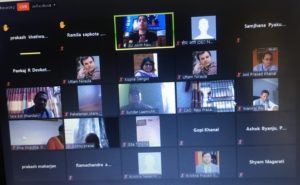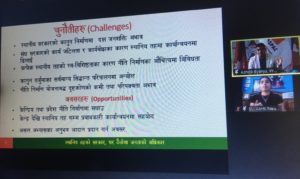Role of the stakeholders in Local Government Policy Formulation Process :

The constitution of Nepal, 2015 has envisioned three spheres of the government. The constitution has explicitly provisioned the power of the three tiers of the government. The local governments have completed four years of operation of the federal governance system. During this period, the local governments have formulated various laws and regulations in pursuant to the constitutional provisions. However, the local governments have not been able to exercise their rights and their performance is below expectation. Many local governments have not been able to formulate new laws and consequently their work have been debatable and challenged in the court and in some cases the courts have decided against them.
The local governments are the most immediate to the people. Their main function is service delivery by formulating and implementing laws related to good governance, health, and environment protection and promotion, among others. However, the local government’s inability to formulate laws and execute them has dissatisfied people to some extent. In this context, a policy discussion on The Role of the stakeholders in Local Government Policy Formulation Process was organized on June 17 2021 by the civil society organizations with an objective of facilitating the local governments in their law-making process.
Objective of the program
- Sharing of the experiences of the local governments in law-making process
- Issues and challenges of the local governments in making laws
- Role of civil society in making the laws by the local governments
- Role of the Ministry of Federal Affairs and Local Development in making the laws by the local governments
Event Proceeding
- Preparation meeting :
The meeting was collectively organized by different six CSOs working in the Bagmati province. Various meetings of all the organizers were held to prepare for the event. In the preparatory meeting, the concept of the program, resource person finalization, and participant type were discussed.
- Event details
Civil Society Mutal Accountability projects implementing partners of the Bagmati province; Samudayik Sarathai Kathmandu, HURADEC Nepal Dolakha, SOCH Nepal Kathmandu, IHRICON Kathmandu, DEC Nepal Chitwan, Community Development Center Nuwakot in coordination with NGO Federation Nepal organized the event on The Role of Stakeholders in the Local Government Policy Process.
The event was divided into 3 sessions. In the 1st sessions of the event Municipality Association (MuAN) and National Association of Rural Municipalities (NARMIN) shared Local Governments policy formulation process.
Presenting paper at the program, President of the Federation of Municipalities and Chief of Dhulikhel Municipality Ashok Byanjo said that the local government has not yet been able to work independently. He said that the local government has not yet achieved some of the constitutional rights. He also drew the attention of the central government on the issues. Speaking on the event, he said that the local government has done remarkable development initiatives within limited capacity and resources.
Chairman Byanjo, stressed on the need for exchange of good practices between the central, province and the local governments. As the local government is also an autonomous government, its existence and good practices should be respected by the central and province governments. He also stressed on the need to increase citizen participation at the policy making level to hold local government transparent and accountable.
Similarly, Rajendra Pyakurel, Executive Director of the National Association of Rural Municipalities Nepal (NARMIN), presented on the status and challenges of local governments in the policy process. Although there was space for civil society participation in the policy process, it was not very effective.On the occasion, he said that there was a lacking of capacities human resources to formulate required laws and policies at most of the local government. He also highlighted that, Due to the dominance of the executive committee over the village assembly, the policy process has been challenging.
Presenting the working paper at the program, Pyakurel highlighted that some of the policy made by the local government were not practical, most of the palika copied the policy provided by federal government so such policy are not in line with the need of local government. The focus of the local governments has been on development activities so there are difficulties in the implementation of the policy. He said that, even if some local governments attempt to implement the model policy referred by the federal government but there was a linguistic complexity and needed to be resolved. He also stressed the need for cooperation and coordination from the federal government in drafting local government policy.
Ms. Mina Sharma chairperson IHRICON gave a collective presentation on behalf of the civil society. The presentation highlighted how the organizations working in Bagmati are facilitating the policy process of the local government. Along with that good practices in promoting citizen participation in the local government policy process were also presented. Similarly, NGO Federation,Mr. Jit Ram Lama, stated on the need to increase citizen participation in policy formulation and implementation at the local level. He also advised that, as civil society organizations are the guardians of development the government should pay attention and take them along.
In the second sessions of the event, open discussion was carried out. During the session participants raise their issues, queries which were addressed by concerned person.
At the end of the session program invitee presented their remarkable words. Speaking on the event, Bagmati Minister for Internal Affairs and Law Keshav Raj Pandey said that, the federal government will work in coordination and cooperation with the province and local governments. Stating that the constitution has emphasized on coordination, co-existence and cooperation between three layers of government and work would be done accordingly. Constitution has define jurisdiction of the local government so some policies have already been made and implemented by the local level as local level elections were held before province election.Since the federal government has not been able to make policy on time which affecting province government to finalize province policy and due to such issues, the local government also facing problems in its policy process.
He added that, there was some ambiguity and indifference about common right provided by the constitution, “It still needs to be clarified,” The local government was facing problems due to lack of capacitate human resource including legal advisors and province government is planning for its management. The state government is always ready to amend and refine some of the law, policies formulated by the province if it’s not applicable to implement in local government.At the end of the speech he stated, “Our aim is to strengthen the local government,” and we are moving forward with close ties with the local government.
Speaking on the occasion, Joint Secretary Mr. Gopi Krishna Khanal Ministry of Federal Affairs and General Administration said that, he was working in the capacity development section of the local level and would take initiative to include the inputs, feedbacks of the discussion in the next action plan. In collaboration with MUAN, NARMIN and University, the Ministry has taken forward the policy lab concept to find the gap in the policy process. Therefore, Khanal expressed that policy process going on a good roadmap despite of some weaknesses while working.
Program chair Ms. Sikha Shrestha, concluded the program by thanking all the guests, speakers and participants presented in the program. The event was moderated by Mr. Tara Bhandari, Executive director of Samudayik Sarathi. The Event was attended by 132 people including Province Parliament member, Local Government representatives, civil society, civil society organizations, Dalit Federation, Disabled Association, Federation of the Blind, NGO Federations representatives.
